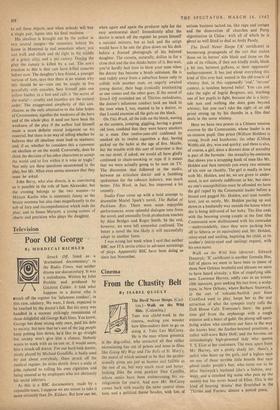Television
Poor Old George
By MORDECAI RICHLER
Struck off, listed as a 'dramatised documentary' in the Radio Times, was neither drama nor documentary. It was a melodrama. Written by John Prebble and produced by Gilchrist Calder, it told what happens to a doctor who is struck off the register for 'infamous conduct'; in this case, adultery. We were, I think, expected to be touched by the doctor's fall. But his story was handled in a manner strikingly reminiscent of those delightful old George Raft films. You know, George has done wrong only once, paid his debt to society, but now that he's out of the jug people keep putting him down, he'd like to go straight but society won't give him a chance. Nobody wants to work with an ex-con or, it would seem, hire a struck-off doctor. For our hard-luck doctor, nicely played by Michael Goodliffe, is badly used by just about everybody. Once struck off the medical register, he slides slowly down a scale of jobs, reduced to rolling his own cigarettes and being sneered at by employers who are obviously his social inferiors.
As this is a BBC documentary, made by a reputable team, I suppose we are meant to take it more seriously than Dr. Kildare. But how can we, when again and again the producer °pis for the easy sentimental shot? Immediately after the doctor is struck off the register he pours himself a suicidal mixture, but as luck and the script would have it he sets the glass down on his desk before a framed photograph of his beloved daughter. The camera, naturally, dollies in for a close shot and the doc thinks better of it. But wait, you've hardly had time to blow your nose when the doctor has become a brush salesman. He is sent rudely away from a suburban house only to collide with another man, an eagerly awaited young doctor, their bags ironically interlocking as one comes and the other goes. If the mood of Struck Of) reminded me of Thirties melodrama, the doctor's infamous conduct took me back to the time when I, too, wanted to be a doctor, so that I could examine all the girls on the block.
On This Week, all the kids on the block, waving at the camera, jumping, giggling, having a grand old time, confided that they were heavy smokers to a man. One twelve-year-old confessed he smoked six to twelve cigarettes a day, having picked up the habit at the age of five. Maybe, but the trouble with this sort of interview is that on our street, if asked, we would all have gladly confessed to chain-smoking or rape if it meant that we were actually going to be seen on TV. The discussion that followed in the studio, between an articulate doctor and a fumbling spokesman for the tobacco industry, was much better. This Week, in fact, has improved a lot recently.
Studio Four came up with a bold attempt to dramatise Muriel Spark's novel, The Ballad of Peckham Rye. There were some enjoyable performances, some splendid dialogue torn from the novel, and unusually fresh production touches by Alan Bridges and Roger Smith. In the end, however, we were left somewhat confused. The better a novel the less likely it will successfully adapt to another form.
I was wrong last week when I said that neither BBC nor ITA invite critics to advance screenings of plays. Apparently BBC have been doing so since last November.


































 Previous page
Previous page